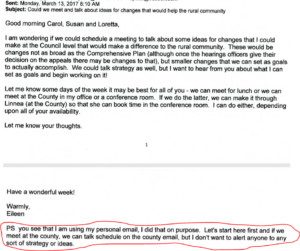Did Eileen Quiring try to sidestep public disclosure requirements to email Clark County Citizens United?
 On March 13, 2017, Clark County Councilor Eileen Quiring turned to her personal email and typed out a message with the subject: “Could we meet and talk about ideas for changes that would help the rural community.”
On March 13, 2017, Clark County Councilor Eileen Quiring turned to her personal email and typed out a message with the subject: “Could we meet and talk about ideas for changes that would help the rural community.”
Just three months earlier, Quiring, a Republican, had been sworn in to Tom Mielke’s old seat representing a rural and conservative district. The email was sent to Carol Levanen and Susan Rasmussen, of property rights group Clark County Citizens United, as well as Loretta Steele (who appears to be a Republican Party activist).
Rasmussen and Levanen have been strongly allied with Quiring, who identified property rights as one of her key issues and advocated policies to allow landowners to subdivide their land. Quiring asked about setting up a meeting to “talk about some ideas for changes that I could make at the Council level that would make a difference to the rural community.” She wrote that the changes wouldn’t be as broad as the comprehensive plan (the county’s overarching planning document) “but smaller changes that we can set as goals to actually accomplish.” She suggested meeting for lunch or at the county building.
Quiring ended her email with a PS: “you see that I am using my personal email, I did that on purpose. Let’s start here first and if we meet at the county, we can talk schedule on the county email, but I don’t want to alert anyone to any sort of strategy or ideas.”
The PS in Quiring’s email, which was released in response to a public records request by county critic Bridget McLeman and has since resurfaced on Facebook, is potentially concerning.
In Washington, public officials aren’t supposed to use government resources (such as county email, phones or IT equipment) for personal political business. Public officials can use their private emails or phones for communications related to government business. However, under the 2016 Nissen Supreme Court case, communications related to government business are subject to the state’s public records law and have to be disclosed even if they’re on a private email or device.
In her recent interactions with this reporter, Quiring has insisted on discussing county business on her county-issued phone while refusing to discuss her personal political ambitions (i.e. run for Clark County GOP vice-chair). But in the PS, Quiring appears to be discussing county business (the county council, the comprehensive plan) using a private email with the aim of preventing it from being disclosed. Just recently, Quiring took some heat for what appeared to be a violation of the state’s open meeting law while lobbying for the appointment of a political ally to the planning commission.
Quiring said that the PS in her email had to do with political strategy, which is why she sent if from her personal email. She said that the first part of the email had to do with an effort to help rural landowners who recently saw Alternative 4, a proposed zoning change, voted out of the comprehensive plan.
The PS, she said, had to do with a “past conversation” about what the Clark County Republican Party could do to help support rural property owners and the state’s restrictive Growth Management Act.
Quiring said she wasn’t trying to keep anything out of public disclosure. She said that the date of the email coincided with a resolution being considered by the Clark County Republican Party in support of property rights.
Why asked why she wrote to “start here first” and what she was worried people would be alerted to, Quiring said that she was likely thinking that “as soon as people know you are trying to make some changes they build opposition.”
Quiring, a former Oregon legislator who previously wasn’t subject to Washington’s expansive public records law, said that this was one of the first records requests she had to respond to as a councilor. When pressed about why a personal/political subject would be included as part of a county email, Quiring said: “I made the mistake of using my personal email to talk about that.”
“I was kind of green at the time,” she said, adding that she’s hopefully learned since then.
It is worth noting that Quiring did comply with the records request and forked over the records and didn’t cost the county a bunch of money, unlike some people. Since then she also appears to be good about keeping her personal email from her government, unlike other people.
So what was this GOP resolution about? I reached out to David Gellatly who served as chair of the Clark County Republican Party in 2017. Gellatly forwarded a copy of the resolution. It exalts property rights and calls for five-acre minimum lots. The resolution also repeats many Clark County Citizens United talking points that the county used an inaccurate population projection in its comprehensive plan and excluded rural residents from the process.
In a Facebook message, Gellatly said that the resolution didn’t move forward.
“It had too many incorrect claims and called certain people communists and other names,” he said. “I spent time reviewing it with others and we agreed due to the inaccuracies and name calling, it was not something we wanted to consider further although the general idea was certainly something we supported.”
Gellatly also forwarded an email thread showing Quiring was interested.
